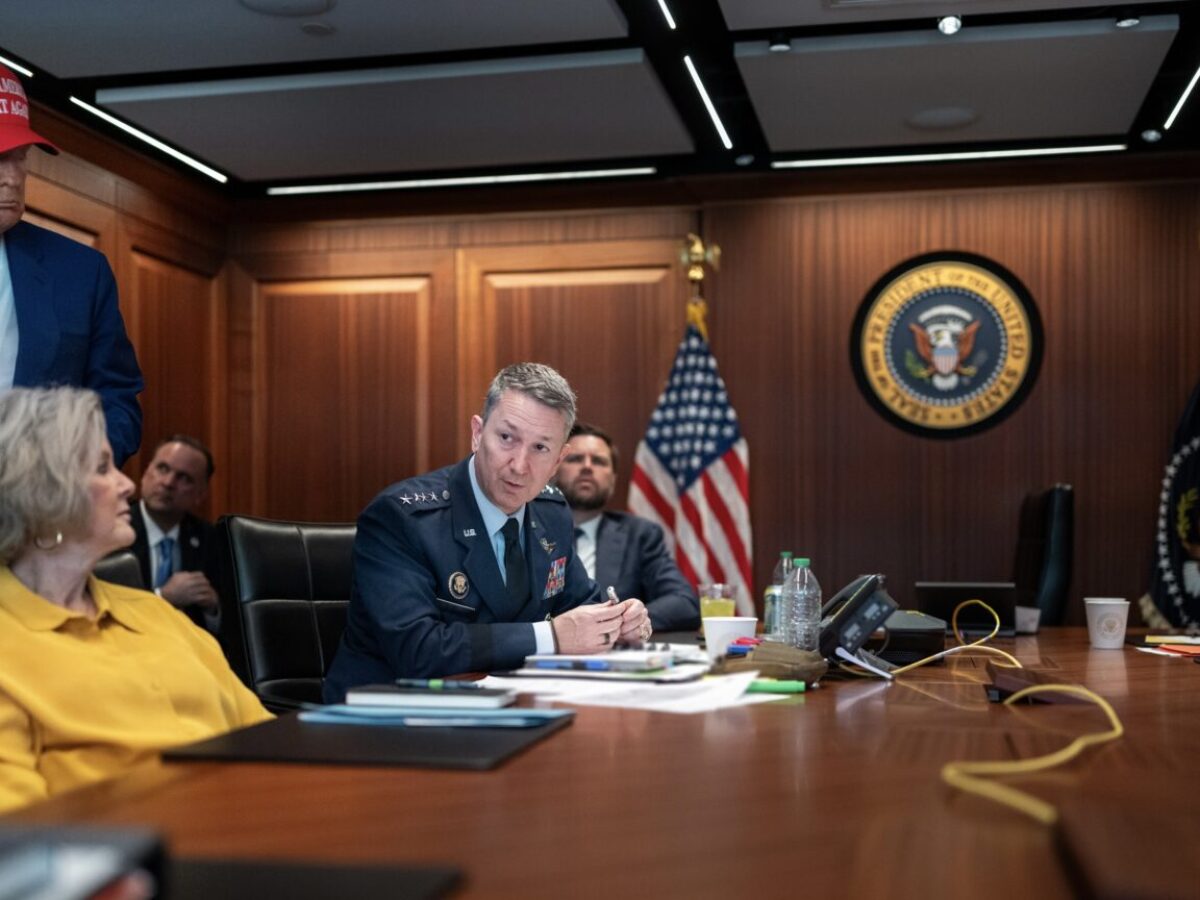Vijay Prashad on why the US attack on Iran was illegal and why the attack could actually spur nuclear weapons proliferationMembers of the Trump cabinet in the Situation Room ahead of the US attacks on Iran. Photo: White House
On June 21, the United States struck three locations in Iran with its massive military force. These locations were Fordow, Isfahan, and Natanz – three areas where Iran has its nuclear energy facilities.
To be clear, Iran’s nuclear energy facilities are legal and continue to be inspected and validated by the International Atomic Energy Agency (IAEA). Iran joined the IAEA in 1958, shortly after the United Nations agency was established. It has been a member of the IAEA since then and has followed the general lines of the rules set up for the peaceful use of nuclear energy. Despite immense pressure on the IAEA from the Global North to sanction Iran, the IAEA reports have been clear that Iran has not violated the rules and is not a nuclear weapons state. Iran has also not threatened the United States and has not attacked the United States or its assets. At the same time, there has been no United Nations Security Council resolution under Chapter VII of the UN Charter that allows the United States to attack Iran. Therefore, the United States and Israel have violated international law by conducting a war of aggression against Iran.
Iran has said that there is no nuclear contamination in the area of the facilities, which means that the United States was not able to penetrate these highly protected centers. Thus far, there appears to be little appetite in the Trump administration to expand this bombing campaign and take its aggressive war into Iran’s cities as the Bush administration did to Iraq. But there is no guarantee that there will not be a widening of the war and that it will not go beyond the strikes on the nuclear energy facilities. If Iran does not surrender at the talks that are anticipated, the United States and Israel might very well bomb Tehran and attempt to kill Iran’s leadership and seek to overthrow the government.
Both the United States and Israel have misunderstood Iran. The World Values Survey shows us that Iranians respond clearly and in large numbers to the questions that reflect national pride: 83% said that they are proud of their country, and 72% said that they are ready to fight for their country (in the United States, the latter percentage is merely 59). At the annual rallies held across the country to mark the February 11 Revolution, a very large number of people attend and march enthusiastically. The attacks on Iran have not weakened this resolve but seems to have increased it. Despite the attacks, people have been coming onto the streets to demonstrate their anger at them and their resolution to fight anyone who attacks Iran and their sovereignty.
There will be no easy road for the United States and Israel to unravel the Islamic Republic and to bring into power their proxies, such as Reza Pahlavi, the descendant of the Shah of Iran who lives in Los Angeles (United States). The high rates of patriotism in Iran and the resolve of the Iranian people will stay the hand of the United States to try and invade Iran (Iran’s population is 90 million, while Iraq’s population is 45 million, and since the US could not subdue Iraq it is unlikely that it can subdue a population twice the size and one which is very young – with the median age being 33). A cowardly bombing of Iran is already done, but a military invasion of Iran is out of the question for countries that simply do not want to face a vigorous resistance from street to street.
The US-NATO destruction of the Libyan state (2011) and this US-Israeli attack on Iran now proves to countries such as North Korea that the nuclear shield is necessary. Indeed, North Korea’s refusal to denuclearize its military establishment now shows countries across the Global South that if they want to protect their sovereignty then building up a conventional army is insufficient. Iran will likely withdraw from the Nuclear Non-Proliferation Treaty (1968), cease its cooperation with the IAEA, and build a nuclear weapon. Egypt, Saudi Arabia, and Turkey will likely follow this process and totally destabilize the Middle East, while Myanmar will likely increase its cooperation with North Korea for missiles and a nuclear weapon. It is a logic shield for countries that are closely watching Iran’s sovereignty being violated not because it has a nuclear weapon, but because it does not have a nuclear weapon.
The greatest spur to nuclear weapons proliferation will be this attack on Iran.
Slowly, larger and larger groups of people have begun to drift onto the streets, horrified by the implications of this hyper-imperialist attack by Israel and then by the United States. There have been statements from groups across the world to condemn these attacks and to assert the fact that peace and development are the desires of the world’s people, not war and backwardness. There is no confusion amidst the people of the Global South that this attack by Israel and the United States has nothing to do with Iran’s behavior but everything to do with the war aims of the Global North to dominate West Asia.


